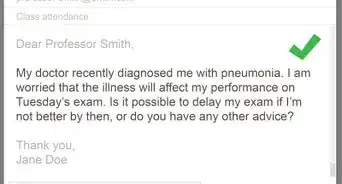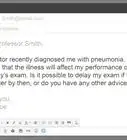X
wikiHow is a “wiki,” similar to Wikipedia, which means that many of our articles are co-written by multiple authors. To create this article, 33 people, some anonymous, worked to edit and improve it over time.
This article has been viewed 122,124 times.
Learn more...
No matter what age you are, seeing a parent in hospital who's suffering from a serious condition is always a stressful and upsetting time. You feel helpless because they are helpless and vulnerable. This article is written for you, with the hope that it may provide some helpful advice on how to cope in such a situation.
Things You Should Know
- Take time between hospital visits to decompress, exercise, and practice self-care.
- Write out your thoughts and feelings to help process emotions as they come up, and surround yourself with loved ones.
- Talk to your parent’s doctor or nurse if you have questions or concerns.
Steps
-
1
-
2Eat regularly. Don't skip meals! You must take good care of yourself in order to have the energy needed to look after your loved one, and to cope emotionally.[2] Sugary foods like chocolate are beneficial for coping with shock or stress, while berries and soups boost your immune system - many people can catch serious infections simply from visiting the hospital on a regular basis. Stay strong.Advertisement
-
3Use this time to understand the relationship you have with your parents. You may have to take the role of responsible adult while they're in this powerless position, just as they did for you when you were young and vulnerable. Be patient, and you be will rewarded with insights that will help to create a stronger bond between you.
-
4Visit your parent with another family member, or a close friend who understands what you're going through. For support. If you wish, you may request some time alone with your parent; this can provide comfort for some people.
-
5Write. Writing out your thoughts and feelings is an important part of dealing with your situation, as if you don't get your feelings out in a constructive manner, you will only end up lashing out at someone else, and this doesn't help anyone. Start a journal or diary just for this occasion and decide whether or not you would like to share this with family members or your parent.[3]
-
6Be in good company. Keep yourself surrounded by a support group of those who care about you and understand what you are going through. Go out for a meal, stay in and cook a meal, share a cup of tea or coffee, or work on a project together where possible. Don't be afraid to spend time on your own if you need some space to think, but don't become a recluse as this can damage your already fragile emotional state.[4]
-
7Be kind to yourself. Perhaps you've already spent, or are spending, several hours at the hospital. The air in hospitals can be drying, so make sure to bring plenty of bottled water with you to keep hydrated. Give yourself time to take walks in or around the hospital. If you visit the hospital along with other family members, consider starting a rota so that everyone can take some time out to relax.
-
8Be educated. Read about your parent's illness and know what the next steps in the process might be. Prepare yourself as best you can for what may come next. Tell your parent that you love him/her as often as possible.
-
9You may have to cancel a lot of well-planned appointments. Try not to feel frustrated about it but rather, use the experience to reflect upon how your parent must have met all of your childhood demands uncomplainingly when they, too, may have had tight schedules to consider. Doing this will help provide you with a sense of uniqueness and let you know just how dearly you've always been loved by them.
-
10Pray. It doesn't matter what religion you are - or whether you have a religion at all. This is a spiritual appeal to something greater than yourself, a way of expressing your feelings in the form of a prayer, either to a god/gods/goddesses or just the Universe itself.[5] It will help you get through this difficult time.
- Hope for the best. Sometimes the best thing you have is hope.
-
11If you feel okay with it (keep in mind that some people don't) visit your parent as often as possible and talk to them. They can tell you what's happening and reassure you.[6]
-
12Cry. Crying is cleansing and helps release pent up emotions, washing bottled up 'stuff' out of your system. Don't be afraid to let the tears out; the supportive people you surround yourself with will understand.
-
13Talk to your parent's doctor/nurse or carer. They'll know about the treatment they're being given and they'll be able to answer any questions you might have.
-
14If the illness is severe, and you are the primary carer, you will have to be ready for care if and when they're discharged. Schedule accordingly, keep a small note pad and pen handy at all times, and keep a diary and record of medications and reports (in a file) as they may be needed later on as they progress with sessions.
-
15Stay positive. There's much to be said for remaining positive, as best you can, in this situation. Your parent may be fretting about the burden their situation has placed upon you. Remember, they're not used to this role reversal after having spent a lifetime being the responsible adult for you. If they can see or sense that you're 'holding up' and being positive, it can help alleviate some of that worry. The benefit for you is this: nothing is ever hopeless and the end only paves the way for a beginning. There is always hope. Positive thinking, if nothing else, alleviates some of the wear and tear of stress on you.
-
16Prepare yourself for what may lie ahead. Be prepared, but don't let forethought feel like you're giving up. Sadly, nothing can prepare you emotionally for a deterioration in a loved one's state. Being practically prepared, however, will mean far less stress for you and those around you, in the event the worst case scenario occurs. Consult the physician or nurse in charge and ask them to explain risks and any possible side effects which may arise from treatments.
Advertisement
Warnings
- Always prepare for the situation ahead. If anything should happen, you will be prepared.⧼thumbs_response⧽
Advertisement
References
- ↑ https://www.loyola.edu/department/counseling-center/services/students/concerns/illness-loved-one
- ↑ https://www.loyola.edu/department/counseling-center/services/students/concerns/illness-loved-one
- ↑ https://www.psychologytoday.com/intl/blog/how-healing-works/201811/15-journaling-exercises-help-you-heal-grow-and-thrive
- ↑ https://www.goodtherapy.org/blog/how-to-cope-when-your-loved-one-is-ill/
- ↑ https://www.goodtherapy.org/blog/how-to-cope-when-your-loved-one-is-ill/
- ↑ https://www.psychologytoday.com/intl/blog/how-do-life/201708/7-keys-coping-loved-one-s-serious-illness
About This Article
Advertisement




















-Step-14-Version-2.webp)






















































Medical Disclaimer
The content of this article is not intended to be a substitute for professional medical advice, examination, diagnosis, or treatment. You should always contact your doctor or other qualified healthcare professional before starting, changing, or stopping any kind of health treatment.
Read More...